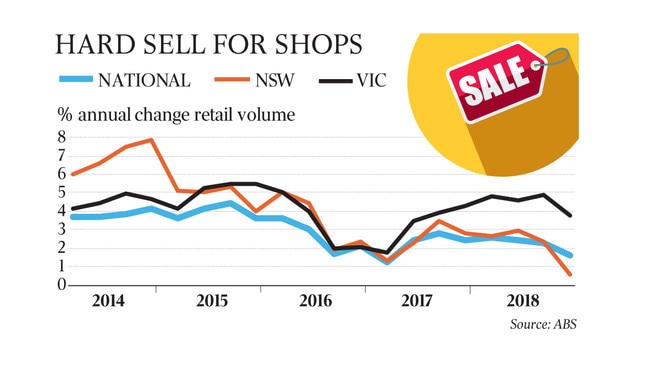Christmas retail sales fall as buyers fret over property and pay slump
Fall in Christmas retail sales adds to evidence that households are fretting about falling house prices and weak income growth.
A fall in Christmas retail sales adds to evidence that the economy is slowing as households fret about falling house prices and weak income growth.
The December retail report from the Australian Bureau of Statistics, which was released as the Reserve Bank board was holding its first meeting for the year, was much weaker than expected and showed NSW, which had been the biggest driver of national economic growth for the past five years, was losing its momentum.
Governor Philip Lowe said the RBA retained its belief that the economy would achieve growth of 3 per cent this year supported by rising business investment and government spending on infrastructure, but he conceded the risk of a worse result was rising.
“The main domestic uncertainty remains around the outlook for household spending and the effect of falling housing prices in some cities,” he said.
“Growth in household income has been low over recent years, but is expected to pick up and support household spending.”
Dr Lowe said the Reserve Bank’s latest growth forecast was slightly lower than expected last year, when he foreshadowed growth of 3.5 per cent, and he indicated that the return of inflation to above 2 per cent would take until early 2020, longer than previously predicted.
He still expected the jobless rate to decline further to 4.75 per cent over the next couple of years, commenting: “The stronger labour market has led to some pick-up in wages growth, which is a welcome development.”
However, the Reserve Bank’s upbeat view of the outlook is being challenged by recent evidence of a softening in growth, including the latest retail sales.
After making adjustment for the Christmas season, the ABS reported retail sales fell 0.4 per cent in December with all sectors except for food and restaurants suffering a drop in sales. Sales of household goods were hardest hit, dropping 2.8 per cent and were only 1 per cent above a year earlier. Sales fell in all states except Western Australia, where they rose by just 0.1 per cent.

The growing popularity of “Black Friday” sales in November is pulling forward some sales that would previously have been made in December, but new ABS figures showing the volume of retail sales, excluding price movements, show there was only a 0.1 per cent rise in the final three months of the year.
Economists said this raised the prospect of the December quarter GDP repeating the very weak household consumption spending that also dragged growth lower in the September quarter.
Commonwealth Bank senior economist Gareth Aird said households were losing personal wealth as house prices fell and this was affecting their spending. “Despite decent employment growth, a tightening labour market and a gradual lift in wages growth, spending growth has eased.”
He said the effect of falling wealth was most obvious in NSW, where house price falls had been sharpest. Annual sales growth in the state had slowed to just 1.7 per cent, while the measure of sales volumes in the December quarter fell 1.1 per cent.
Victoria, where house prices were also falling, was still enjoying decent retail growth, but there was concern the weakness in NSW might spread.
Dr Lowe cast doubt on whether the September quarter GDP was really as weak as the 0.3 per cent reported, saying the consumption data had been volatile and subject to revision.
However, the latest retail sales report is consistent with numerous partial indicators, such as online sales, business surveys and reported results from listed retailers. Both business and consumer confidence have been weaker.
International trade results in December, which were also released yesterday, provided further evidence of weak domestic demand. The trade surplus rose sharply to $3.7 billion, the highest since late 2016, but only because imports fell more sharply than exports. Imports in December were down 5.7 per cent from the previous month, while exports dropped only 1.6 per cent.
For the full year, consumer goods imports were soft, showing growth of only 3.7 per cent. Exports were 14 per cent higher.



To join the conversation, please log in. Don't have an account? Register
Join the conversation, you are commenting as Logout